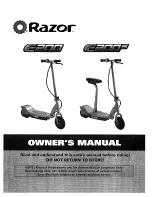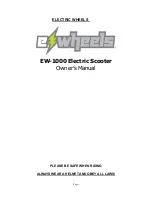
General Maintenance
Tire Pressure:
The tire pressure can range from 15 psi for lighter aircraft, up to 28 psi for heavier
aircraft.
Transaxle:
This is a sealed unit and should not require maintenance or fluid.
Drive Wheel Bearings:
Permanently lubricated.
Caster Zerk Fittings:
Needs to be lubed periodically to ensure ease of caster wheel steering.
Drive Chains:
Apply chain lube periodically depending on use and environment.
Tools Needed For Assembly:
Wire cutter, utility knife, 5/16” - 1/2” - 9/16” & 11/16” sockets
and / or wrenches.
Assembly
Note:
All reference to “right” and “left” orientation is made while standing behind the tug
and looking forward. The “rear” or “back” of the tug is the end the operator stands.
Battery Maintenance:
1. Keep batteries fully charged.
2. Battery connections should be kept tight at all times. Periodic inspection is recommended.
3. Keep batteries clean from all dirt and corrosion.
4. Batteries should not be discharged to the point of no longer being able to power the tug. Keeping the
batteries fully charged will greatly reduce the risk of a dead battery when you need it most.
5. Batteries should be brought up to a full charge at the earliest opportunity using the built in 24V battery
charger with reverse polarity protection and float mode. The battery charger should be left on when the tug
is parked to maintain proper charging and maintenance of batteries at all times. Keeping the batteries fully
charged will reduce the risk of freezing in cold temperatures.
6. Avoid charging the batteries when the ambient temperature exceeds 120
o
F.
7. Periodic battery testing is an important preventative maintenance procedure. Hydrometer readings of each
cell while fully charged gives an indication of balance and the true charge level. Imbalance could mean the
need for equalizing, and is also a sign of potentially improper charging or a bad cell. Voltage tests (open
circuit, charged or discharged) can identify a bad or weak battery. Load testing will identify a bad battery
when other methods fail. A weak battery will cause premature failure of a companion battery.
8. Extreme temperatures can substantially affect battery performance and charging. Cold temperatures
reduce battery capacity and retard charging. Heat increases water usage resulting in overcharging.
www.airtug.com
2


























